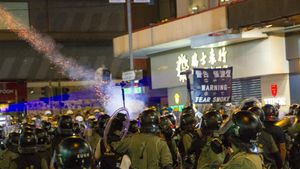Newly declassified documents from U.S. intelligence have unveiled sinister insights about Vladimir Putin's alleged assassination agenda targeting his political adversaries. Over the course of his 25-year rule, numerous political dissenters, critics, and anyone he perceived as a threat have met untimely and mysterious ends, leading many to speculate about the direct involvement of the Kremlin.
The Office of the Director of National Intelligence (ODNI) recently released findings after years of demanding transparency on this dark side of Putin’s governance. The intelligence memo indicates, with high confidence, Putin's probable authorization of assassinations of high-profile figures abroad. It points out how Russian intelligence services have historically been mobilized against individuals deemed as threats to his regime. The report reveals names—some notorious—of individuals believed to have been killed on Kremlin orders.
Among the first cases cited is the assassination of Zelimkhan Yandarbiyev, the former leader of Chechen separatists, who was killed by Russian military intelligence operatives back in 2004. The operation took place in Qatar and ended with Yandarbiyev meeting his fate following an explosive attack. While the perpetrators were apprehended and sentenced, they eventually vanished back to Russia, illustrating the cross-border reach and efficacy of Putin's assassination strategy.
Even more infamous is the case of Alexander Litvinenko, another former FSB officer who became one of Putin's vocal critics. Litvinenko was poisoned with radioactive polonium-210 in London, resulting in his agonizing death three weeks later. A British inquiry concluded with the chilling finding—likely on Putin’s orders, asserting, "the evidence points toward approval from the highest levels of the Russian government." Litvinenko's priority contact with the UK's MI6 intelligence only added more layers to this troubling narrative.
The unsettling revelations do not stop there. The mysterious death of Alexander Perepilichnyy, who was poised to spill confidential details about Kremlin-linked tax fraud, also raises eyebrows. He tragically collapsed after dining with his mistress, and U.S. intelligence sources now allege he was likely poisoned with biological toxins—a calculated move to silence him.
Further highlighting Putin’s reach are the deaths of political figures like Oleksandr Bednov, another vocal critic of the Kremlin from Ukraine, who was reportedly taken down due to his defiance of Moscow's orders. The murky circumstances surrounding these deaths paint a full picture of how dissent is dealt with under Putin’s regime.
Putin’s ominous approach to silencing dissent extends to other high-profile cases—many under suspicious circumstances. Alexei Navalny, one of the most well-known opposition leaders, was reportedly killed during his incarceration at the Polar Wolf jail, purportedly from extreme conditions. The latest intelligence suggests he may have suffered severe maltreatment leading to his demise.
Yevgeny Prigozhin, who led the Wagner Group and had previously been close to Putin, faced the ultimate consequence after attempting to lead a rebellion against Putin’s orders. He met his end during what was described as a fiery plane crash—something many speculate was orchestrated by the Kremlin as retribution for his insubordination.
The intelligence findings touch upon several individuals believed to have been targeted by Putin due to their threats against him. The report draws connections to dozens of unsolved deaths linked to critics and opponents of the regime. Such audacious actions reveal the extensive lengths to which Putin may go to maintain his grip on power, illustrating how assassination has transformed from shadowy whispers to official intelligence assessments. Critics of the Kremlin are left living under the specter of fear, their lives often teetering on the brink due to their opposition.
The vigilance against dissent has led to calls for greater international responses to Putin's tactics, with some analysts urging Western nations to bolster sanctions and improve defensive resources for those targeted by the Kremlin. This dark narrative of political maneuvering signals dire consequences for anyone who challenges the status quo within the Russian leadership.
Based on this new intelligence, global leaders are prompted to reconsider their diplomatic strategies concerning Russia. Understanding Putin’s potential as a threat means grasping the reality of international political assassination—a grim but stark feature of modern statecraft under his regime. The released report serves as both documentation of investigations and a clarion call to the international community, illuminating how dissent is rooted out under Putin’s iron fist.



